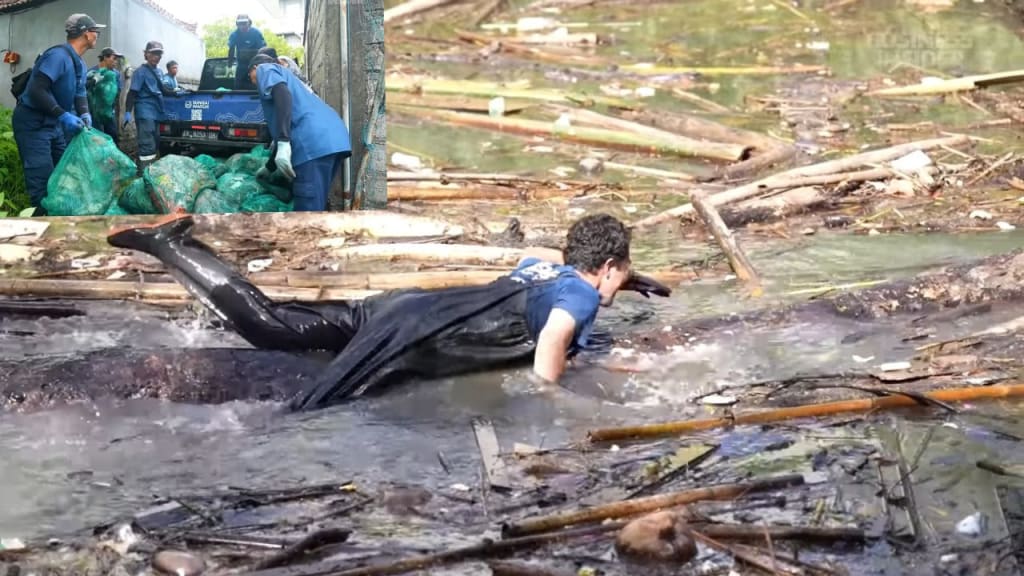Racing Against Time: Cleaning Indonesia's Rivers to Protect the Oceans
Cleaning Indonesia's Rivers to Protect the Oceans

Racing Against Time: Cleaning Indonesia's Rivers to Protect the Oceans
Indonesia is home to some of the world's dirtiest rivers, and a dedicated team is racing against time to clean them up. This nonprofit organization, Sungai Watch, has made it their mission to remove trash from these rivers by hand, and they are making significant strides.
A resident living along one of these rivers sent a video, highlighting the urgent need for cleanup. The team quickly sprang into action, knowing that the next heavy rain could wash this plastic waste straight into the ocean, where it would be nearly impossible to collect. Sungai Watch, founded by Gary and his siblings Sam and Kelly in 2020, has already cleaned up over 2,000 tons of trash across Bali and East Java in just four years.
From Trash to Treasure: Turning Waste into Useful Products
The organization partners with other companies to recycle the collected trash, transforming it into useful items like sandals and chairs. "We find so much random stuff, from dildos to condoms," one of the team members said. Despite the overwhelming amount of waste, they see value in what others might consider trash. They call it "modern-day mining," searching for the most valuable pieces of plastic to recycle.
Every day, Sungai Watch's team of 30 people cleans up rivers near various villages. On this particular day, they focused on a river near a seaside village in southern Bali. In just three hours, they managed to collect about two tons of waste, mostly plastic, that would otherwise end up in the ocean.
The Sorting Process: Categorizing the Collected Waste
The collected waste is transported to one of Sungai Watch's nine sorting facilities across Bali and East Java. Here, the trash is sorted into 30 different categories based on material, color, and quality. This detailed sorting process helps the organization understand the brands and types of plastic they are dealing with, and it aids in recycling efforts.
The most recyclable items, like plastic bottles, are compressed into solid bricks for easier transport. Each press can compact up to 1,000 plastic bottles into a 25-kilogram cube. However, only about a third of the waste Sungai Watch collects can be recycled by external facilities. This challenge has led the team to get creative with the rest.
Creative Solutions: Recycling Flip-Flops and Plastic Bags
One of the biggest sources of plastic waste they collect is flip-flops. To address this, Sungai Watch has partnered with a company called Indosole to turn discarded sandals into new ones. They have collected over 200,000 sandals since they started. At Indosole's factory, the trash is ground down, heated, and molded into new sandal soles. Each color has a unique recipe, with the final product being both functional and eco-friendly.
In 2024, the siblings launched another company, Sungai Design, to turn plastic bags collected from rivers into furniture. Their first product is a lounge chair made from 2,000 plastic bags. Despite their efforts, about 40% of the waste still ends up in landfills because it is too degraded or difficult to recycle.
The Bigger Picture: Reducing Plastic Waste in Indonesia
Indonesia produces nearly 7 million metric tons of plastic waste each year, and more than half of it is mismanaged. Much of this waste ends up on roadsides, in poorly regulated landfills, or at illegal dump sites. Sungai Watch sends out teams every Friday to clean these places. When plastic waste enters a river, it often comes from these illegal landfills.
In 2015, a study ranked Indonesia as the second biggest contributor to marine plastic pollution in the world. The problem worsened after China stopped accepting waste from other countries in 2017, leading to a spike in Indonesia's plastic waste imports. In response, the Indonesian government set an ambitious goal to reduce marine plastic waste by 70% by 2025, but progress has been slow.
Daily Battles: The Ongoing Fight Against River Pollution
Sungai Watch has installed 170 floating barriers across Bali and East Java to trap plastic waste in rivers. These barriers need daily attention to prevent trash from piling up. The organization records data on the weight and type of trash collected, which they use to advocate for better waste management policies.
The group's efforts have caught international attention, and they draw inspiration from other organizations like The Ocean Cleanup. This Dutch nonprofit has removed over 200,000 kilos of trash from the Pacific Ocean and developed machines to capture waste before it reaches open waters.
Looking Ahead: Education and Community Involvement
Sungai Watch believes that big changes are possible. They conduct educational sessions and workshops to teach local communities about sorting waste and reducing plastic use. They've had successes, such as partnering with the local government to clean heavily polluted areas and working with other NGOs to develop educational programs.
Despite the challenges, Gary and his team remain hopeful. "We truly believe that Bali can be free of plastic. It will probably take a couple of years, but we hope to get there," he says. With continued effort and community support, Sungai Watch is making a significant impact in the fight against plastic pollution.
About the Creator
Enjoyed the story? Support the Creator.
Subscribe for free to receive all their stories in your feed. You could also pledge your support or give them a one-off tip, letting them know you appreciate their work.






Comments
There are no comments for this story
Be the first to respond and start the conversation.